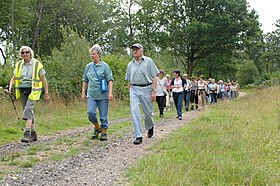
Back العناية الذاتية Arabic تهلية شخصية ARY Грижа за себе си Bulgarian Selbstfürsorge German Autocuidado Spanish خودمراقبتی Persian טיפול עצמי HE Perawatan diri ID セルフケア Japanese 자기돌봄 Korean
| Self-care | |
|---|---|
 Walking is beneficial for the maintenance of good health. | |
| MeSH | D012648 |
Self-care has been defined as the process of establishing behaviors to ensure holistic well-being of oneself, to promote health, and actively manage illness when it occurs.[1] Individuals engage in some form of self-care daily with food choices, exercise, sleep, and hygiene.[1] Self-care is not only a solo activity, as the community—a group that supports the person performing self-care—overall plays a role in access to, implementation of, and success of self-care activities.
Routine self-care is important when someone is not experiencing any symptoms of illness, but self-care becomes essential when illness occurs.[2][3] General benefits of routine self-care include prevention of illness, improved mental health, and comparatively better quality of life.[4][5][6][7] Self-care practices vary from individual to individual. Self-care is seen as a partial solution to the global rise in health care costs that is placed on governments worldwide.[8]
A lack of self-care in terms of personal health, hygiene and living conditions is referred to as self-neglect. Caregivers or personal care assistants may be needed. There is a growing body of knowledge related to these home care workers.[9]
Self-care and self-management, as described by Lorig and Holman, are closely related concepts.[10] In their spearheading paper, they defined three self-management tasks: medical management, role management, and emotional management; and six self-management skills: problem solving, decision making, resource utilization, the formation of a patient–provider partnership, action planning, and self-tailoring.[10]
- ^ a b Alexander Segall; Jay Goldstein (1998). "Exploring the Correlates of Self Provided Health Care Behaviour". In Coburn, David; D'Arcy, Alex; Torrance, George Murray (eds.). Health and Canadian Society: Sociological Perspectives. University of Toronto Press. pp. 279–280. ISBN 978-0-8020-8052-3. Retrieved 29 August 2013.
- ^ "Self-care: What is it? Why is it so important for your health?". UAB News. Retrieved 29 November 2022.
- ^ "Self-care interventions for health". www.who.int. Retrieved 29 November 2022.
- ^ Jonkman, Nini H.; Schuurmans, Marieke J.; Groenwold, Rolf H.H.; Hoes, Arno W.; Trappenburg, Jaap C.A. (2016). "Identifying components of self-management interventions that improve health-related quality of life in chronically ill patients: Systematic review and meta-regression analysis". Patient Education and Counseling. 99 (7): 1087–1098. doi:10.1016/j.pec.2016.01.022. PMID 26856778.
- ^ Jonkman, Nini H.; Schuurmans, Marieke J.; Jaarsma, Tiny; Shortridge-Baggett, Lillie M.; Hoes, Arno W.; Trappenburg, Jaap C.A. (2016). "Self-management interventions: Proposal and validation of a new operational definition". Journal of Clinical Epidemiology. 80: 34–42. doi:10.1016/j.jclinepi.2016.08.001. PMID 27531245.
- ^ Jonkman, Nini; Westland, Heleen; Trappenburg, Jaap CA; Groenwold, Rolf HH; Bischoff, Erik WMA; Bourbeau, Jean; Bucknall, Christine E.; Coultas, David; Effing, Tanja W.; Epton, Michael; Gallefoss, Frode; Garcia-Aymerich, Judith; Lloyd, Suzanne M.; Monninkhof, Evelyn M.; Nguyen, Huong Q.; Van Der Palen, Job; Rice, Kathryn L.; Sedeno, Maria; Taylor, Stephanie JC; Troosters, Thierry; Zwar, Nicholas A.; Hoes, Arno W.; Schuurmans, Marieke J. (2016). "Do self-management interventions in COPD patients work and which patients benefit most? An individual patient data meta-analysis". International Journal of Chronic Obstructive Pulmonary Disease. 11: 2063–2074. doi:10.2147/COPD.S107884. PMC 5012618. PMID 27621612.
- ^ World Health Organization. "WHO consolidated guideline on self-care interventions for health". Retrieved 8 September 2021.
- ^ Eze, Nkiruka D.; Mateus, Céu; Cravo Oliveira Hashiguchi, Tiago (2020). "Telemedicine in the OECD: An umbrella review of clinical and cost-effectiveness, patient experience and implementation". PLOS ONE. 15 (8): e0237585. Bibcode:2020PLoSO..1537585E. doi:10.1371/journal.pone.0237585. PMC 7425977. PMID 32790752.
- ^ Sterling, Madeline R.; Barbaranelli, Claudio; Riegel, Barbara; Stawnychy, Michael; Ringel, Joanna Bryan; Cho, Jacklyn; Vellone, Ercole (2020). "The Influence of Preparedness, Mutuality, and Self-efficacy on Home Care Workers' Contribution to Self-care in Heart Failure". Journal of Cardiovascular Nursing. 37 (2): 146–157. doi:10.1097/JCN.0000000000000768. PMC 8196074. PMID 33315614.
- ^ a b Lorig, Kate R.; Holman, Halsted R. (August 2003). "Self-management education: History, definition, outcomes, and mechanisms". Annals of Behavioral Medicine. 26 (1): 1–7. doi:10.1207/S15324796ABM2601_01. ISSN 0883-6612. PMID 12867348. S2CID 3678991.
© MMXXIII Rich X Search. We shall prevail. All rights reserved. Rich X Search